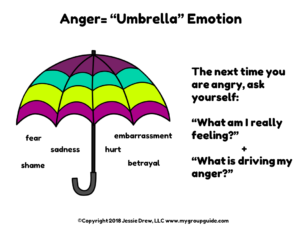Dealing with Anger
Resilience Case Management Team
Anger is a common and very real emotion that every single human deals with. However; for survivors, this emotion can be overwhelming and confusing. As survivors of domestic violence begin to come to terms with the abuse they’ve endured, they experience emotions all over the emotional spectrum. Psychiatrist Elizabeth Kübler-Ross describes this process in her Stages of Grief model where a person passes through emotions such as denial, anger, bargaining, depression, and acceptance. It is common to jump from one of these emotions and back to another, feeling as though you’re on an emotional roller-coaster. Often, survivors feel guilty in the depression stage because they miss their abusive partners or have moments of remembering good times and those thoughts can lead into anger. Because of all of these underlying emotions that can cause it, anger is often described as an “umbrella” emotion.
How we cope with anger can be influenced by family members and our experiences with anger growing up. Often times, it is socially acceptable for anger to be handled with violence, but there are ways to cope with anger that don’t involve risking harm to yourself or another person.
Here are some alternative ways to deal with feelings of anger:
Learn your anger triggers. Practice paying attention to the signals your body gives you when you begin to feel angry. Do you feel it in your arms? Legs? Do you get a headache? Our bodies tell us long before our brains are aware that we are feeling something. Once you know more about the triggers that make you angry, you can have enough awareness to take further steps to handle it without violence.
Practice journaling. You can track some of these triggers by journaling or even log your anger in order to identify patterns in your emotions.
Practice breathing techniques. Our brains need oxygen to work properly and it’s common to not breathe deeply when we are stressed, anxious, or angry. This is why it is key for us to consciously practice various breathing techniques to help calm ourselves down. We can count to 10, practice slowly inhaling so that we are filling our bellies instead of our chests with air, and slowly exhaling that air. After repeating several times, you are likely to feel calmer.
Make a list of distractions for yourself. Do you enjoy going for walks? Reading? Drawing? Talking to friends/family? Baking/cooking? Lifting weights? Playing with a pet? Find positive distractions that will help you when you are feeling angry.
Give yourself the space you need to calm down. Time–outs are often thought of as something that we give to children who are in trouble, but time-outs are important for adults, too. It’s okay to walk away from situations that are upsetting you in order to calm yourself.
Feeling angry is normal, especially when it comes to being a survivor of domestic violence. If this is something you find yourself struggling with, Resilience is here to help. We have advocates and counselors available to provide support to you through it.
For immediate support, reach out to us at:
24-Hour Help Line: 1-800-848-5991
Hablamos Español: 1-866-728-2131
Safe E-mail: GinnyP411@gmail.com

